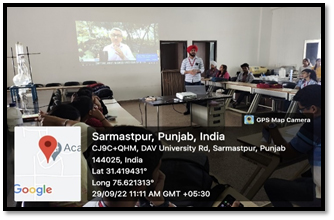Industrial tours serve as a vital link between classroom learning and real-world biotechnology applications, providing students with invaluable hands-on experience. By observing sophisticated equipment and industrial workflows in action, students gain a deeper understanding of complex bioprocesses. Beyond academic learning, extracurricular activities play a crucial role in developing creativity, teamwork, and communication—essential skills for the next generation of biotech innovators. These combined experiences broaden students’ perspectives and inspire them to pursue diverse career paths in research, manufacturing, and regulatory affairs. Together, such initiatives help cultivate well-rounded biotechnologists, fully prepared to meet the dynamic demands of the industry with confidence and competence.
At the DAV University, the Department of Biotechnology places strong emphasis not only on academic excellence but also on the holistic development of students. In addition to rigorous classroom learning, the department actively involves students in industrial tours and a variety of university-level activities. These initiatives aim to enrich their practical knowledge, enhance soft skills, and provide real-world exposure. Highlighted below are some of the department’s ongoing efforts to make the Biotechnology program dynamic and engaging:
- Industry Visits
Industry visits are an integral part of student-centered learning, offering firsthand exposure to the practical applications of theoretical concepts. These experiences help bridge the gap between academic instruction and real-world industrial practices, deepening students' understanding of biotechnological processes, emerging technologies, and professional environments. By observing live operations such as research workflows, automation, and quality control, students gain valuable practical knowledge and career direction. Additionally, these visits promote critical thinking, innovation, and skill development while providing opportunities to interact with industry professionals—making education more engaging, dynamic, and industry-relevant.
1.1 Visit to ICAR- Central Potato Research Station, Jalandhar
The Department of Biotechnology organized an industrial visit to the ICAR-CPRI Research Station for undergraduate and postgraduate students, with a total of 70 participants accompanied by faculty members. The ICAR-CPRI Research Station, Jalandhar (Punjab) one of the seven regional centers of the ICAR- Central Potato Research Institute, Shimla (Himachal Pradesh), is recognized for its excellence in plant tissue culture, particularly for producing disease-free potato plantlets.
A major highlight of the visit was the station’s patented aeroponics facility, which enables the cultivation of high-yield potato plantlets by generating a greater number of tubers. Additionally, students observed the use of drone-driven fertilizer delivery systems—an innovative approach to minimize nutrient runoff and enhance fertilizer efficiency in potato fields.
The primary objective of this visit was to provide students with practical insights into the journey of plants from lab to field, while also introducing them to sustainable and precision agriculture practices. This experience significantly enriched their understanding of modern agricultural biotechnology and its real-world applications.
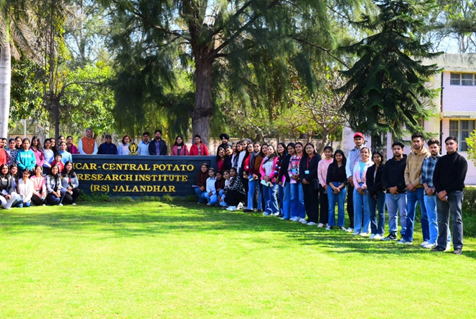
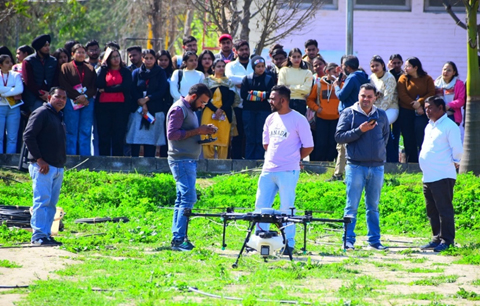
Students from the Department of Biotechnology, DAV University, observing a live demonstration of drone-assisted hi-tech farming at the ICAR- Central Potato Research Station,
1.2 Visit to Mefro-Organics Pvt. Limited
The Department aimed to provide students with real-time exposure to high-throughput machinery relevant to their coursework in Bioanalytical Techniques and Molecular Diagnostics, as well as to give them an inside look at the production and packaging of
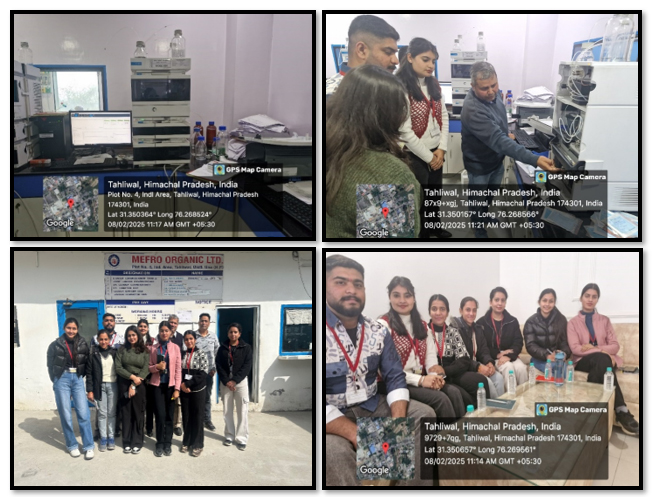
pharmaceutical products such as tablets, creams, and soaps. Upon arrival, students were welcomed in the lounge area where the company served refreshments.
During the visit, students observed sophisticated instruments such as the potentiometer and tablet dissolution machine in operation. A highlight of the visit was an interactive session with the Quality Control Head, who explained the interpretation of HPLC chromatograms and how such analyses are integral to pharmaceutical quality assurance in industrial settings.
1.3 Visit to CSIR- IHBT, Palampur, Himachal Pradesh
An educational trip was organized by the Department of Biotechnology to the CSIR-IHBT, Palampur, Himachal Pradesh from 27th to 29th March, 2023. The trip was conducted under the supervision of the Dr. Lakhmir Singh, (Coordinator, Department of Biotechnology). A total of 45 students from both Undergraduate and Postgraduate programs participated in this academic excursion. During the visit, students had the opportunity to explore Neva Plantations, where they were introduced to advanced techniques in Plant Tissue Culture. Experts at the facility explained and demonstrated the in vitro propagation methods used for the cultivation of blueberry and apple plants, emphasizing the applications of tissue culture in modern agricultural biotechnology.
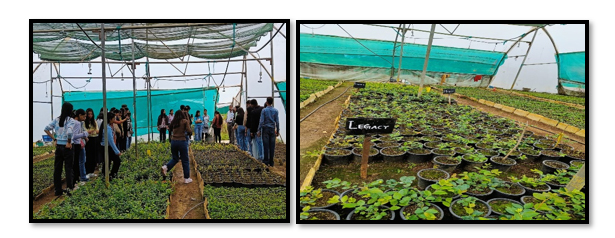
Mr. Tilak then demonstrated the acclimatization and hardening of plantlets, a crucial stage in developing healthy plants. He provided a thorough explanation of the essential abiotic conditions
Figure: From top left to right – a sequence showcasing advanced high-tech analytical instruments used in the analysis of organic and inorganic compounds. The figure shows a live demonstration of HPLC operation by company professionals, illustrating its role in qualitative and quantitative compound analysis. The figure concludes with a group photograph including the Department Coordinator (COD), faculty members, and company executives, commemorating the insightful industrial visit.
required for optimal plant growth.
Students recently visited CSIR-IHBT, Palampur, Himachal Pradesh, where they enjoyed the scenic beauty of the Tulip Garden. The highlight of the visit was exploring the state-of-the-art
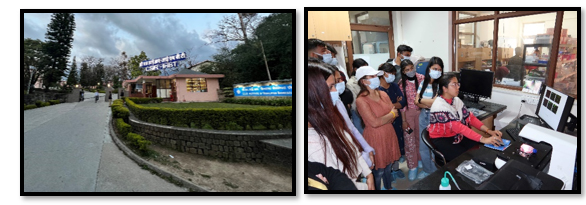
research laboratories. In particular, they toured the Molecular Biology Lab, where a group of scientists provided detailed explanations about the functioning of various laboratory instruments.
The most anticipated part of the visit was a tour of Dr. Amitabha Acharya’s Chemical and Nanobiotechnology Laboratory, where students were introduced to some of the most sophisticated scientific instruments. The scientist provided an engaging explanation of the Scanning Electron Microscope (SEM), Atomic Force Microscope (AFM), and Transmission Electron Microscope (TEM), detailing their working principles and their capacity for high-resolution imaging at the nanoscale.
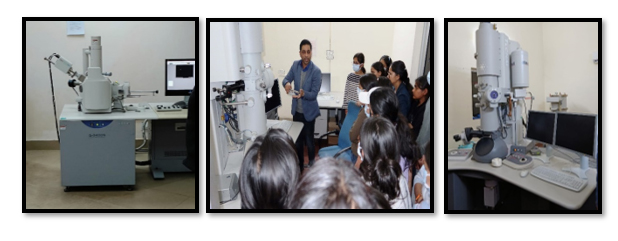
Figure: Students being demonstrated the principles and working of electron microscopy during their visit. The session included insights into the functioning of scanning and transmission electron microscopes, showcasing their role in high-resolution imaging at the molecular and cellular levels.
The students were particularly intrigued by the visit to the Animal Cell Culture Laboratory, where they gained a comprehensive understanding of the steps involved in drug development — from the selection of potential drug molecules to market readiness. A highlight of the session was the demonstration involving A549 lung cancer cell lines, where students observed morphological changes following the administration of anticancer drug molecules. Comparative assays used for analysis and sample examination were also discussed, giving students valuable insights into real-world biomedical research.

The next destination was Dr. Dharam Singh’s Lab, dedicated to microbial genomics and enzymology. A research fellow demonstrated the use of 2-D gel electrophoresis and related technologies used to study enzyme structures and functions. Students also received valuable guidance on career pathways and specializations available at the master's level, broadening their academic perspectives.
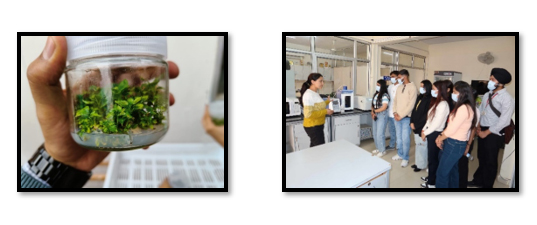
At the Molecular Plant Virology Lab, students learned about groundbreaking research on gene silencing in chlorophyll pigment within tobacco plants. They were introduced to the mechanisms through which viroids infect plants, which sparked engaging discussions on plant-pathogen interactions. Additionally, a visit to the Plant Tissue Culture Laboratory highlighted ongoing efforts to regenerate endangered and pharmaceutically valuable plant species through advanced biotechnological techniques. The tour also included a stop at the Tea Processing Unit, adding a practical agricultural dimension to their learning.
Fun-Oriented Learning Through Mentor-Mentee Engagement
The educational tour was not just an academic experience but also fostered joyful and engaging learning through mentor-mentee interactions. Students were not only educated but also motivated, counselled, and guided through informal discussions and interactive sessions.
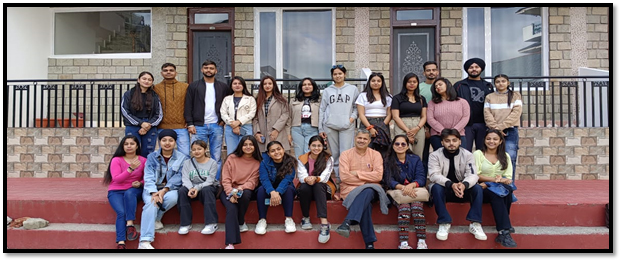
A memorable moment of the trip was captured in a group photograph of the students with faculty members at Hotel Residency, reflecting the unity and excitement of the educational tour.
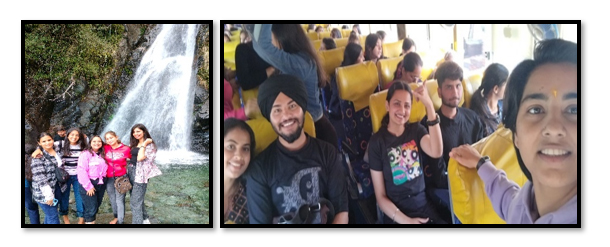
During their stay in McLeod Ganj, Dharamshala, the group explored several local attractions. Highlights included a refreshing visit to the Bhagsu Nag Waterfall, a serene experience at the Dalai Lama Temple (Namgyal Monastery)—a center of Tibetan spirituality and peace—and a walk through the local market, where students enjoyed the vibrant culture, cuisine, and handicrafts of the region.
To conclude the day, students visited the Ecological Park, Saurabh Van Vihar where the Aquarium was a major attraction. Here, they learned about various economically important fish species. The trip ended on a high note as the students explored the rich regional flora, appreciated biodiversity, and captured the beauty of nature through their lenses.
Student Activities:
World Environmental Health Day Celebration
Department of Biotechnology, 29th September 2022, Jalandhar
With great enthusiasm and a supportive academic environment, the Department of Biotechnology organized World Environmental Health Day, under the guidance of Dr. Praveen Guleria (Head of Department). The event was entirely student-oriented, aiming to raise awareness and strengthen understanding of environmental health systems in alignment with the United Nations Sustainable Development Goals (SDGs).
To promote active engagement and experiential learning, three distinct events were organized:
- PowerPoint Presentation Competition – Each participant was given five minutes to present and discuss topics related to environment and health, centered around the theme “Our Planet, Our Health.”
- Nature Photography Contest – Participants submitted and explained their personally captured images, sharing unique perceptions and interpretations of nature’s beauty and environmental concerns.
- Treasure Hunt – The final event was a fun and educational treasure hunt. Riddles and clues were creatively designed by student coordinators, all focused on raising awareness about environmental and health-related issues.
Overall, the celebration combined fun with impactful learning, fostering a deeper understanding of the vital connection between the environment and human health.
Glimpses of the First Two Events: "Our Planet, Our Health" & Nature Photography
The event series began with two engaging activities centered around the theme “Our Planet, Our Health” and Nature Photography. Participants demonstrated remarkable enthusiasm and creativity, showcasing their insights and perceptions about environmental health through thoughtful presentations and visually striking photographs.
The spirit of active learning continued with a lively Treasure Hunt, where well-crafted riddles—designed by student coordinators under the guidance of faculty members—led teams on an exciting and educational journey.
Overall, the events combined fun with experiential learning, fostering an outcome-based approach to understanding environmental awareness and sustainability.
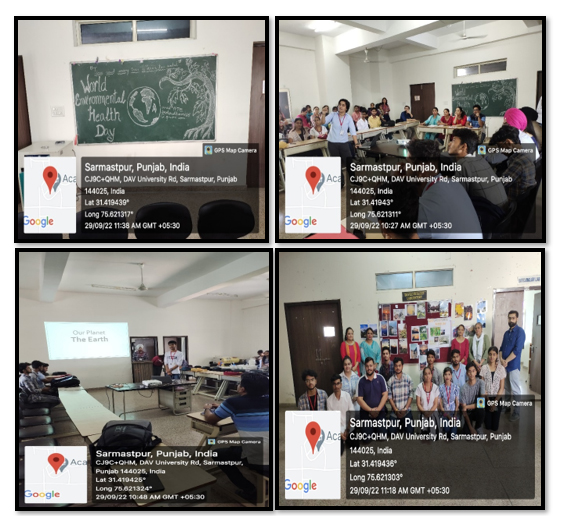
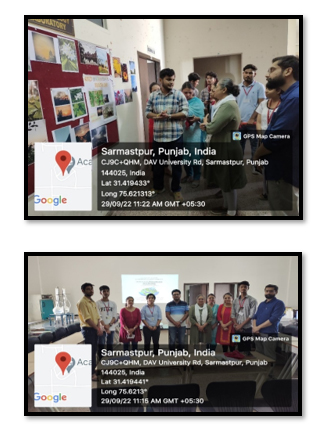
Winners of the events being congratulated by the judges for their outstanding performance. The moment captured reflects celebration, encouragement, and recognition of talent and dedication.
Concluding the Event with a Message on Sustainability
